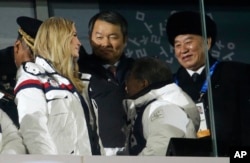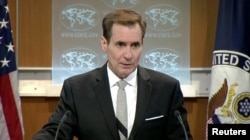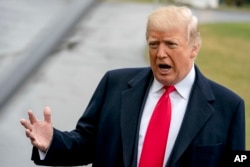The Trump administration is responding tepidly following North Korea’s expression of willingness to hold talks with the United States.
“We will see if Pyongyang’s message today, that it is willing to hold talks, represents the first steps along the path to denuclearization. In the meantime, the United States and the world must continue to make clear that North Korea’s nuclear and missile programs are a dead end,” said a statement issued by White House Press Secretary Sarah Huckabee Sanders.
She emphasized that the U.S., South Korea and the international community “broadly agree that denuclearization must be the result of any dialogue with North Korea. The maximum pressure campaign must continue until North Korea denuclearizes. As President Trump has said, there is a brighter path available for North Korea if it chooses denuclearization.“
Sanders, in South Korea, accompanied President Donald Trump’s daughter, Ivanka, to Sunday’s closing ceremony of the Winter Olympic Games in Pyeongchang.
The head of the North’s visiting delegation to the ceremony agreed, in a meeting with South Korean President Moon Jae-in on Sunday, that “North Korea-U.S. relations must develop along with the South-North Korea relationship, while noting [Pyongyang] has enough intention to hold North Korea-U.S. dialogue,” according to spokesman Kim Eui-kyeom of the South’s Presidential Blue house.
The remark was attributed to General Kim Yong Chol, the head of national intelligence in North Korea.
Kim was in the same VIP box for the sporting event’s closing ceremony with the U.S. official government delegation, which included the uniformed commander of the American and U.N. forces on the Korean peninsula, U.S. Army General Vincent Brooks.
“There was no interaction with the North Korean delegation. The U.S. presidential delegation's attendance at the closing ceremonies was the culmination of a successful trip where we celebrated the Olympic Games, U.S. athletes and our strong alliance with South Korea,” according to a senior U.S. administration official.
It is unclear if Sunday’s statements from North Korean and U.S. officials will lead to any breakthrough between the two countries, which have no diplomatic relations.
“That’s great they want they want to talk to the United States — but about what? Is it about the nukes?” asks Georgetown University Visiting Professor Balbina Hwang, who served as a senior special advisor on North Korea at the State Department during the presidency of George W. Bush.
North Korea has repeatedly insisted its nuclear weapons are not a subject for negotiation.
Washington is now to consult with Seoul about the North’s willingness to talk, according to the State Department.
“We are in close contact with the Republic of Korea about our unified response to North Korea,” said the statement, echoing the White House, that Seoul and Washington agree that “the improvement of relations between North and South Korea cannot advance separately from resolving North Korea’s nuclear program.”
A former State Department spokesman during the Obama administration calls the initial Trump administration reaction “responsible." Retired Navy Admiral John Kirby said on Twitter the U.S. response “maintains denuclearization as end goal, vows continued pressure ... but keeps door open to talks. Hopefully, it represents the next step in a delicate diplomatic dance underway.”
Earlier, North Korea’s Foreign Ministry issued a warning about the imposition of the latest announced U.S. sanctions against Pyongyang.
“As already proclaimed many times, we will regard all blockades as an act of war against us, and we will never try to stop the United States, if it really has pluck to confront us ‘roughly,” said a foreign ministry spokesman, who was quoted by the Korean Central News Agency.
“In countering precisely this intimidation from the United States, we have possessed nuclear weapons, the treasured sword of justice, to defend ourselves,” the statement added.
U.S. President Donald Trump announced on Friday what he called the “largest ever” set of sanctions against North Korea and threatened a “phase two” if the measures aren't effective.
The sanctions target one person, 27 companies and 28 ships registered in China and seven other countries with the intent of eliminating North Korea’s illicit shipping and trade. They block assets held by the companies in the United States and prohibit U.S. citizens from interacting with them.
Since August of last year, the United States has helped oversee three rounds of U.N. Security Council sanctions against North Korea. The pressure has not stopped Pyongyang from conducting more nuclear and missile tests.
The new sanctions’ effectiveness depends on whether they can successfully be implemented. The United States has limited leverage over many of the shipping companies involved in helping North Korea evade sanctions, warns Gary Samore, former White House Coordinator for Arms Control and Weapons of Mass Destruction.
“A lot of the companies working with North Korea are very small,” says Samore. “And they don’t care whether they work with the United States.”
China responded angrily Saturday to the new sanctions, maintaining they are counterproductive to efforts to halt Pyongyang's nuclear and long-range missile development programs. China's foreign ministry also demanded the U.S. immediately lift the sanctions "to avoid harming bilateral cooperation in the relevant area."
The two Koreas have had no diplomatic relations and Seoul was not a signatory to the 1953 armistice that ended a three-year civil war on the peninsula.










